

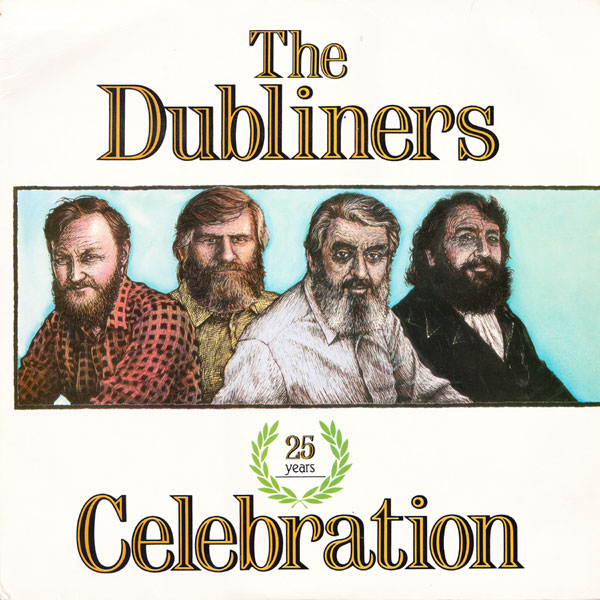 |
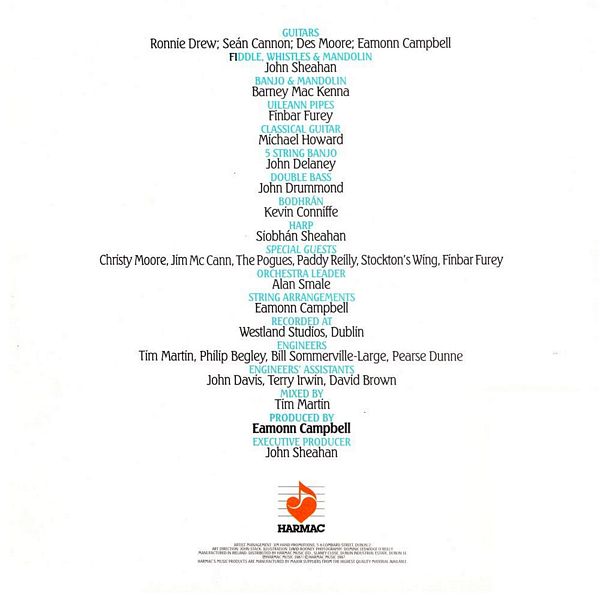
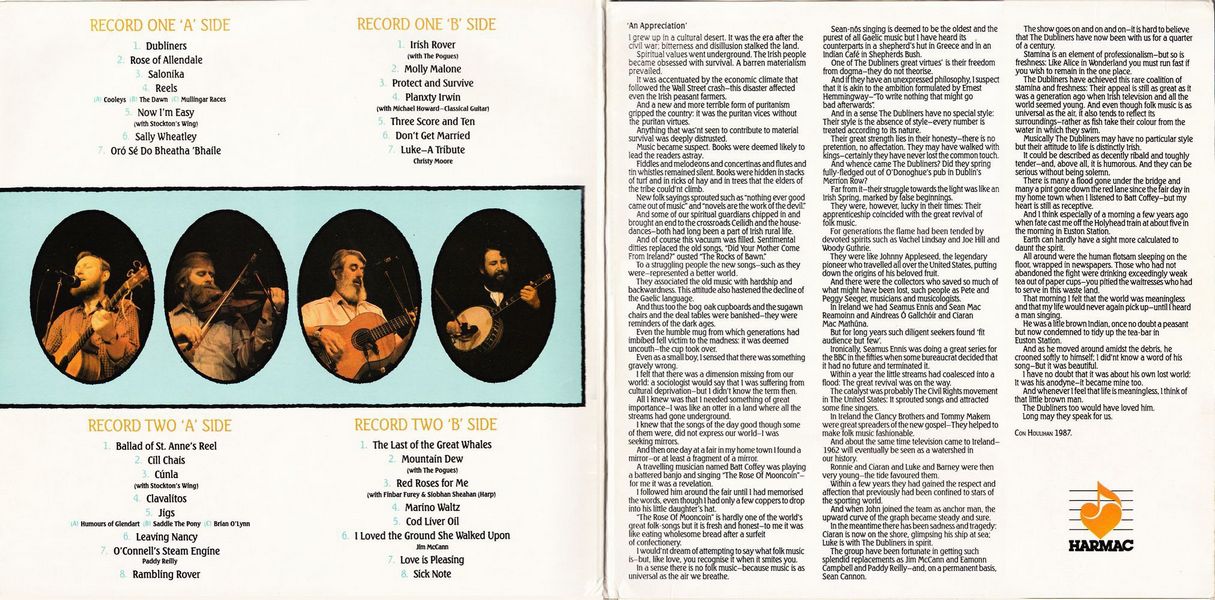 |
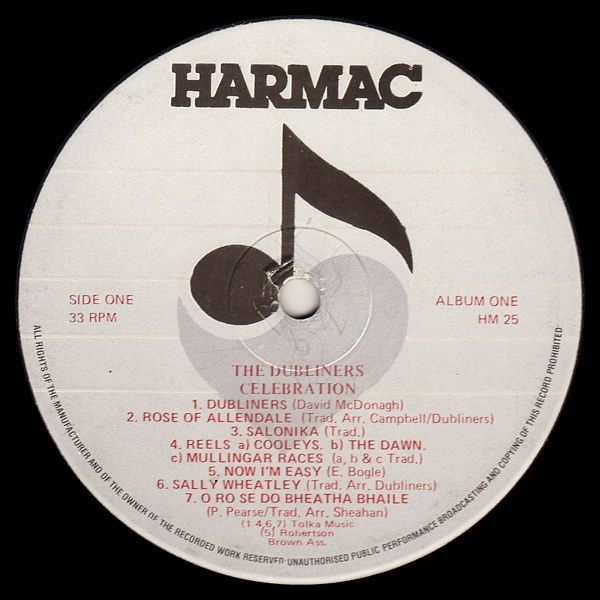
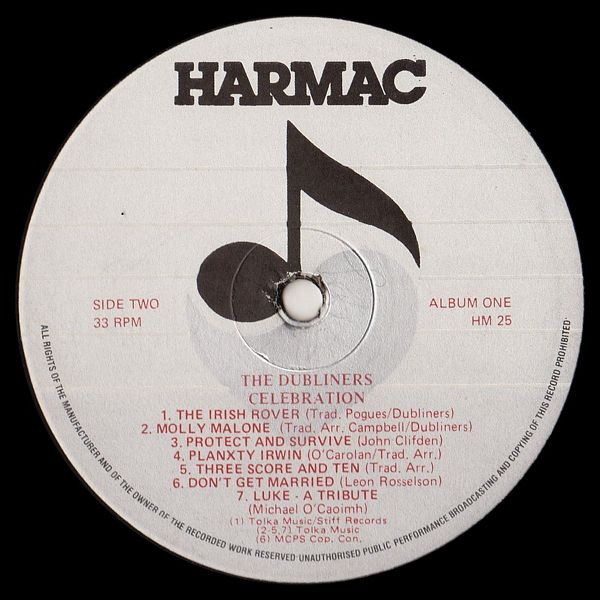
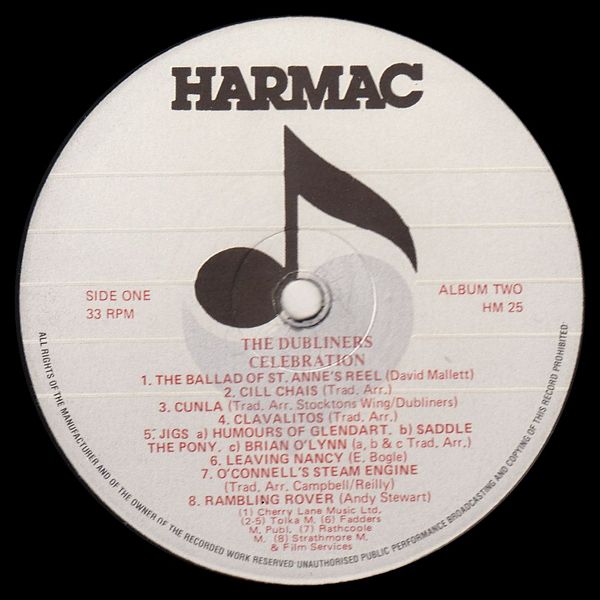
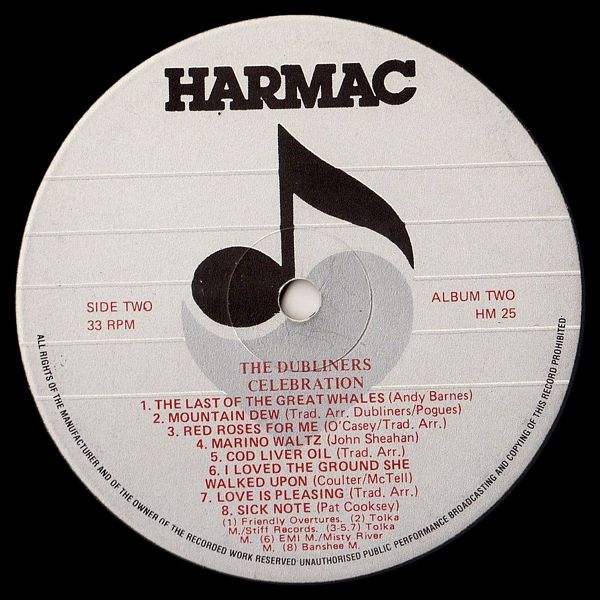 |
Sleeve Notes
I grew up in a cultural desert, It was the era after the civil war; bitterness and disillusion stalked the land.
Spiritual values went underground. The Irish people became obsessed with survival. A barren materialism prevailed.
IT was accentuated by the economic climate that followed the Wall Street crash — this disaster effected even the Irish peasant farmers.
And a new and more terrible form of Puritanism gripped the country: it was the puritan vices without the puritan virtues.
Anything that wasn't seen to contribute to material survival was deeply distrusted.
Music became suspect. Books were deemed likely to lead the readers astray.
Fiddles and melodeons and concertinas and flutes and tin whistles remained silent. Books were hidden in stocks of Turf and in ricks of bay and in trees their the elders of the tribe couldn't climb.
New folk sayings sprouted such as "nothing ever good came out of music" and "novels are the work of the devil".
And some of our spiritual guardians chipped in and brought an end to the crossroads Ceilidh and the house-dances — both had long been part of Irish rural life.
And of course this vacuum was filled. Sentimental dirties replaced the old songs, "Did Your Mother Come From Ireland?" ousted "The Rocks of Bawn".
To a struggling people the new songs — such as they were — represented a better world.
They associated the old music with hardship and backwardness. This altitude also hastened the decline of the Gaelic language.
And thus too the bog oak cupboards and the sugown chairs and the deal table; were banished — they were reminders of the dark ages.
Even the humble mug from which generations had imbibed fell victim to the madness: it was deemed uncouth — the cup took over.
Even as a small boy, I sensed that there was something gravely wrong All I knew was that I needed something of great importance — I was like on otter in a land where all the streams had gone underground.
I knew that the songs of the day good though some of them were, did rot express our world — I was seeking mirrors.
And then one day at a fair in my home town I found a mirror — or at least a fragment of a mirror.
A travelling musician named Batt Coffey was playing a battered banjo and singing "The Rose Of Mooncoin" — for me it was a revelation. I followed him around the fair until I had memorised the words, even though I had only a few coppers to drop in his little daughter's hat.
"The Rose Of Mooncoin" is hardly one of the world's great folk-songs but it is fresh and honest — to me it was like eating wholesome bread after a surfeit of confectionery.
I wouldn't dream of attempting to say what folk music is — but, like love, you recognise it when it smites you.
In a sense there is no folk music — because music is as universal as the air we breathe.
Sean-nós singing is deemed to be the oldest and the purest of all Gaelic music but I have heard its counterparts in a shepherd's hut in Greece and in an Indian Cafe in Shepherds Bush.
One of The Dubliners' great virtues is their freedom from dogma — they do not theorise.
And if they have on unexpressed philosophy, I suspect that it is akin to The ambition formulated by Ernest Hemmingway — "To write nothing that might go bad afterwards".
And in a sense the Dubliners have no special style: Their style is the absence of style — every number is treated according to its nature.
Their great strength lies in their honesty — there is no prefention, no affectation. They may have walked with kings — certainly they have never lost their common touch.
And whence came The Dubliners? Did they spring fully-fledged out of O'Donoghue's pub in Dublin's Merrion Row? Far from it — their struggle towards the light was like and Irish Spring, marked by false beginnings.
They were, however, lucky in their times: Their apprenticeship coincided with the great revival of folk music.
For generations the flame had been tended by devoted spirits such as Vachel Lindsay and Joe Hill and Woody Guthrie.
They were like Johnny Appleseed, the legendary pioneer who travelled all over the United States, putting down the origins of his beloved fruit.
And there were the collector, who saved so much of what might have been lost, such people as Pete and Peggy Seeger, musicians and In Ireland we had Seamus Ennis and Seán Mac Reamoinn and Aindreos O Gallchair and Ciaran Mac Mathuna.
But for long years such diligent seekers found 'fit audience but few.'
Ironically, Seamus Ennis was doing an great series For the BBC in the fifties when some bureaucrat decided that it had no future and terminated it. Within a year the little streams had coalesced into a flood: The great revival was on the way.
The catalyst was probably The Civil Rights movement in The United States: It sprouted songs and attracted some fine singers.
In Ireland the Clancy Brothers and Tommy Makem were great spreaders of the new gospel — they helped to make folk music fashionable.
And about the same lime television came to Ireland — 1962 will eventually be seen as a watershed in our history.
Ronnie and Ciaran and Luke and Barney were then very young — the tide favoured them.
Within a few years they had gained the respect and affection that previously had been confined to stars of the sporting world.
And when John joined the team as anchor man, the upward curve of the graph became steady and sure.
In the meantime there has been sadness and tragedy: Ciaran is now on the shore, glimpsing his ship at sea; Luke is with The Dubliners in spirit.
The group have been fortunate in getting such splendid replacements as Jim McCann and Eamonn Campbell and Paddy Reilly — and, on a permanent basis, Seán Cannon.
The show goes on and on and on — it is hard to believe that The Dubliners have now been with us for a quarter of a century.
Stamina is an element of professionalism — but so is freshness: Like Alice in Wonderland you must run fast if you wish to remain in the one place.
The Dubliners have achieved this rate coalition of stamina and freshness: Their appeal is still as great as it was a generation ago when Irish television and all the world seemed young. And even though folk music is as universal as the air, it also tends to reflect its surroundings — rather as fish take their colour from the water in which they swim.
Musically The Dubliners may have no particular style but their attitude to life is distinctly Irish.
It could be described as decently ribald and roughly tender — and, above all, it is humourous. And they can be serious without being solemn.
There is many a flood gone under the bridge and many a pint gone down the red lane since the fair day in my home town when I listened to Batt Coffey — but my heart is still as receptive.
And I think especially of a morning a few years ago when fate cast me off the Holyhead train at about five in the morning at Euston Station.
Earth can horrify hove a sight more calculated to daunt the spirit.
All around were the human flotsam sleeping on the floor, wrapped in newspapers. Those who had not abandoned the fight were drinking exceedingly weak tea out of paper cups — you pitied the waitress who had to serve in this waste land.
That morning I felt that the world was meaningless and that my life would never again pick up — until I heard a man singing.
He was a little brown Indian, once no doubt a peasant but now condemned to tidy up the tea-bar in Euston Station.
And as he moved around amidst the debris, he crooned softly to himself: I didn't know a word of his song — But it was beautiful.
I hove no doubt that it was about his own lost world: It was his anodyne — it became mine too.
And whenever I feel that life is meaningless, I think of that little brown man..
The Dubliners too would have loved him.
Long may they speak for us.
Con Houlihan — 1987